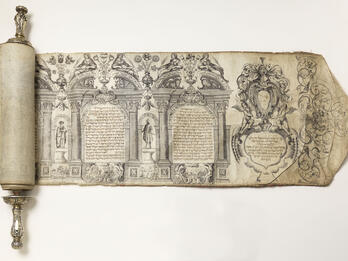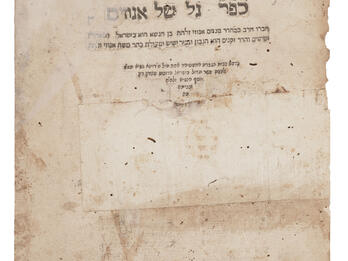Sheloshah perushim (Three Commentaries) on the Song of Songs: On the Edition
One day, I was reading a certain book, which contained eight commentaries on the Song of Songs. More precious than pearls they are; all of their commentaries are sapphires, the words of the living God [see b. Eruvin 13b], the words of the wise are like goads (Ecclesiastes 12:11), a tower built with turrets (Song of Songs 4:4). In my opinion, they all touch upon the central point, or close to it; they are all like mighty men of renown. One of them was written by the aluf,1 known in the gates (Proverbs 31:23); his name is R. Joseph Ibn Kaspi. The others are R. Abraham Levi, She‘ar yashuv, R. Ezra, R. Se‘adya Gaon, R. Samuel Vivas, R. Shemariah of Negroponte, and R. Moses Ibn Halawa, of blessed memory. The sage R. Yuda Ibn Halawa informed me in Damascus that this last author was the grandson of R. Baḥya, as he was known as R. Baḥya Ibn Halawa.
When I saw these pearls, I realized that they have been forgotten from people’s hearts like the dead, with none to search for them or seek them out, as the Torah has almost been forgotten from Israel, due to all the terrible troubles, which do not delay the arrival of more and more troubles in turn. For they come in quick succession, the expulsions, plagues, taxes, and levies, with fire flashing up amid the hail (Exodus 9:24). I was in a state of confusion, left wondering and astonished at the vicissitudes of the times, for the righteous man was lost and no one could give me support in all these troubles. The lone exception was one close friend, who said to me, “Why do you look so troubled, when you are not ill? What is different about today? This is nothing other than a bad mood.” I responded, “My beloved friend! I am sick with love [see Song of Songs 5:8], for King Solomon—may he rest in peace—composed his book, and his words are obscure and sealed up. His song has nothing to do with the physical body; it was given only to the wise soul alone, as it concerns the affection of her youth, the love of her espousals (Jeremiah 2:2). For this purpose I had fifteen faithful witnesses [see Isaiah 8:2], but on the day of the fierce anger of the Lord [see Isaiah 13:13] five of them died, and I am afraid that the others might die as well, leaving my soul stranded until the arrival of the powerful redeemer who will resolve mysteries and reveal to us the secret key to interpreting this sweet song about the wise soul.”
He replied, “If so, be fortified and of good courage, and take my staff in your hand [see 2 Kings 4:29], my silver staff, and go to the publishers and write and sign in common script [see Isaiah 8:1], with a pen of iron (Jeremiah 17:1) and of lead, at least two faithful witnesses, as it is in the power of your hand to do so [see Proverbs 3:27], since there is no redeemer apart from you [see Ruth 4:4]. I will come in after you and confirm your words [see 1 Kings 1:14] with all my soul and might [see Deuteronomy 6:5]. I want nothing more than a share in the merit of these righteous ones, of blessed memory; the thousand shall be mine, and the two hundred yours [see Song of Songs 8:12] for the bread of your household.”
I was strengthened by his words, and I girded my loins [see 1 Kings 18:46] and took with me two golden spouts [see Zechariah 4:12]: the commentary of R. Se‘adya Ga’on and the commentary of She‘ar yashuv, which is called Holy of Holies, and I found written that the author’s name is R. Jacob Provencal. Since a threefold cord is not quickly broken (Ecclesiastes 4:12), and a third witness is like the judge who decides the case, I used as an introduction the commentary of R. Joseph Ibn Kaspi, for whereas he writes at length and in detail on the other four scrolls, he deals with Song of Songs only in general terms and in brief, as he was afraid to approach it.
Now, I hereby declare to all the wise of heart [see Exodus 31:6] that my intention is not to acquire riches, in the manner of others who have published books. Rather, I call upon heaven and earth [see Deuteronomy 32:1] to attest that I have published it and have proofread it as best I can, three times over, to rid it of scribal errors, and yet I will not sell it for more than its worth as mere paper, so that people will take it with a whole heart and with a willing mind [see 1 Chronicles 28:9]. Perhaps some generous donor will be found who will support me so that I might publish the other five, and thus they will not be lost from among the assembly of Israel [see Numbers 16:33]; may the redeemer come for us in his merit, so may it be God’s will, and let us say Amen.
Notes
[A Babylonian title, equivalent to “rabbi.”—Trans.]
Credits
Isaac Akrish, “On the edition” in Sheloshah perushim (Three Commentaries of the Song of Songs) by Isaac Akrish (Istanbul: ca. 1575/8). Republished in a Hebrew anthology, 123–124.
Published in: The Posen Library of Jewish Culture and Civilization, vol. 5.




